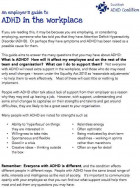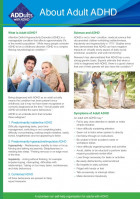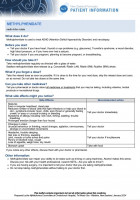
Image credit: Pixabay
ADHD is a neurodevelopmental condition. This means that if you have ADHD there are differences in the parts of your brain which control your ability to plan, organise and focus compared to those without it. ADHD affects about 1 in 20 adults – that’s about 280,000 New Zealanders.
Brain scans and studies of brain function show ADHD brains are wired differently from other people's. The physical and chemical differences affect executive function. Executive function is like the CEO of a company – it's the parts of your brain that control and co-ordinate the rest of your brain. This makes it harder to concentrate on things you don't find interesting and to regulate (be in charge of) your behaviour.
The main features of ADHD are:
- difficulty paying attention (eg, to workplace tasks, conversations, or personal belongings)
- hyperactivity (eg, fidgeting or being unable to sit still, talking or thinking a lot)
- impulsivity (eg, interrupting conversations, difficulty waiting in line).
ADHD is usually diagnosed in childhood. Until recently it was thought that children grow out of ADHD, but it's now known that about 7 out of 10 children with ADHD will still have symptoms as adults. You may have ADHD throughout your childhood but not be diagnosed until you’re an adult.
ADHD often comes with energy and creativity and, if used well, this can help you learn how to manage the more challenging aspects of ADHD as an adult.










